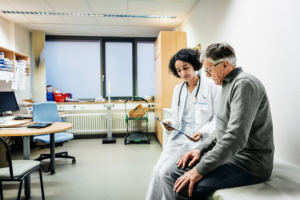Sickle Cell Disease – What is it?
According to the Centers for Disease Control and Prevention, sickle cell disease affects about 100,000 people in the United States.
Despite its prevalence, this condition is frequently misunderstood. Understanding the symptoms of sickle cell disease and the treatment options can help patients and their loved ones better manage their symptoms. Here is what you need to know about SCD.
What is it?
Sickle cell disease is a genetic illness that causes oxygen-carrying red blood cells to malfunction.
SCD causes red blood cells to become hard and sticky, resembling a C-shaped farm tool known as a “sickle.” The sickle cells die early, resulting in a chronic lack of red blood cells. They also get caught and obstruct the blood flow when they travel through small blood vessels.
Pain, and other symptoms of sickle cell disease, are caused by this obstruction of blood flow.
Patients with sickle cell disease, often known as sickle cell anemia, will have a lifelong deficiency of red blood cells.
Am I at Risk?
Individuals are born with the disease, which they receive from both parents. If a person does not have sickle cell disease at birth, they cannot ‘catch’ it from someone who does. They also cannot develop the disease later in life if they do not have it at birth.
Sickle cell disease is tested for at birth in all 50 states, and parents are notified if their child has the condition. Individuals who know they have a family history of sickle cell disease may be eligible for prenatal screening.
Signs and Symptoms
When a person is born with sickle cell disease, symptoms may not appear until they are about six months old.
While the type and severity of symptoms vary from person to person, the following are the most typical signs and symptoms of sickle cell disease:
- Chest, back, and joint pain
- Inflamed fingers or toes
- Yellow skin or yellow in the whites of eyes
- Dizziness, fatigue, low oxygen in the body
Treatment Options
While there is no cure for sickle cell disease currently, there are several successful preventative strategies.
Among them are:
- Immunizations that protect against infections
- Proper hydration and nutrition
- Avoidance of situations that are known to cause sickle-related pain.
It is important to keep in mind that not all therapies are suited for every sickle cell disease patient. Patients and their families should discuss the risks and advantages of each treatment option with their doctors.
The most widespread misunderstanding about sickle cell disease is that it cannot be managed effectively. While the disease cannot be cured, breakthroughs in the study of the disease and the avoidance of its complications have revolutionized the lives of people who suffer from it today and will continue to improve the prospects of future generations affected by sickle cell disease.
Thank you for reading!
Follow our socials:
Instagram: @helphomecarecorp
Facebook: @8334HHCNOW
Twitter: @HelpHomeCareCo1

 Some seniors can be tempted to go without sun protection during the summer months. Some think that if they were going to develop skin cancer, they would’ve by now. Unfortunately, this idea untrue. Sun protection is important for all ages.
Some seniors can be tempted to go without sun protection during the summer months. Some think that if they were going to develop skin cancer, they would’ve by now. Unfortunately, this idea untrue. Sun protection is important for all ages.
 genetics plays a part in health during old age, one important thing that affects your health is how you’ve lived throughout your younger years. If you smoked, the consequences in later life have a chance of being lung cancer, COPD (chronic obstructive pulmonary disease), heart disease or even vision loss. Poor diet is an additional cause of poor health in the elderly. Overeating can cause diabetes, heart problems, and many other illnesses. Many cannot afford to eat properly, still, even if it is within their means, some disregard the importance of keeping a proper diet. This makes them far more susceptible to disease. There are many things you can do to take care of your health while you grow older. Eat smart, the digestive system slows down with age, so eating foods high in fiber would be a good thing to do. Seniors can more easily become dehydrated. Make sure to drink plenty of water to keep your energy up. Always get enough sleep. This can be difficult with restlessness and waking throughout the night which is common among seniors. What can help? Dimming the lights in the evening will encourage drowsiness and keep your bedroom cool, quiet and comfortable. This can help provide you with an atmosphere whereby you can sleep more peacefully.
genetics plays a part in health during old age, one important thing that affects your health is how you’ve lived throughout your younger years. If you smoked, the consequences in later life have a chance of being lung cancer, COPD (chronic obstructive pulmonary disease), heart disease or even vision loss. Poor diet is an additional cause of poor health in the elderly. Overeating can cause diabetes, heart problems, and many other illnesses. Many cannot afford to eat properly, still, even if it is within their means, some disregard the importance of keeping a proper diet. This makes them far more susceptible to disease. There are many things you can do to take care of your health while you grow older. Eat smart, the digestive system slows down with age, so eating foods high in fiber would be a good thing to do. Seniors can more easily become dehydrated. Make sure to drink plenty of water to keep your energy up. Always get enough sleep. This can be difficult with restlessness and waking throughout the night which is common among seniors. What can help? Dimming the lights in the evening will encourage drowsiness and keep your bedroom cool, quiet and comfortable. This can help provide you with an atmosphere whereby you can sleep more peacefully.